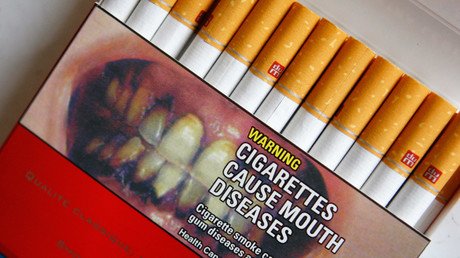200 million Chinese will die due to smoking this century, unless something is done - WHO

The World Health Organization (WHO) has urged China – the world’s biggest tobacco market – to rapidly raise cigarette prices and ban smoking from public places or face the prospect of millions of deaths and a severe economic burden.
“If nothing is done to reduce these numbers and introduce more progressive policies, the consequences could be devastating not just for the health of people across the country, but also for China’s economy as a whole,” said Bernhard Schwartlander, the WHO Representative in China, in a statement accompanying the publication of a new report, called ‘The Bill China Cannot Afford.’
The 45-page document, produced together with the United Nations Development Programme (UNDP) paints a stark picture of tobacco consumption in the country.
In 2015, there were 315 million smokers in China, with 28 percent of all adults buying cigarettes, and 50 percent of all men.
In total 44 out of every 100 cigarettes produced every year worldwide are lit up in China.
As a result, more than 1 million people die annually. With increased cigarette consumption fueled by rising incomes, the total premature death toll from smoking-related causes is likely to be 200 million for this century.
Due to lost productivity and health care costs, China is losing an estimated $57 billion a year – more than 0.5 percent of GDP – as a result of what the authors call a “tobacco epidemic.”
“The rapid increase in costs associated with tobacco use in China is unsustainable,” said Schwartlander.
Economic costs of tobacco use in China is estimated at US$ 57B in 2014, up 1000% since 2000. https://t.co/Fa5p8eyMZC#NoTobaccopic.twitter.com/yHw0mEdSbu
— WHO Western Pacific (@WHOWPRO) 14 April 2017
In May 2015, the government raised taxes on cigarettes from 5 to 11 percent. This resulted in record revenues of $170 billion for the state last year, and the first drop in consumption after 20 consecutive years of tobacco growth, in what the report authors say was a “win-win” situation.
In several European states, more than 80 percent of the price of the cigarette packet is made up of excise tax. In the UK, 60 percent of the money is pocketed by the government, and in the US, around two-fifth.
“If the Chinese Government increased the average retail price of each pack of cigarettes by 50%, this would reduce the number of male smokers by as much as 47 million, with 20 million premature deaths averted over 50 years as a result,” estimates the WHO report.
The authors say the tax hikes wouldn’t affect the poor disproportionately; suggesting that past experience has shown that while wealthier smokers absorb the higher taxes, the poorer ones stop consuming tobacco altogether, particularly benefitting from the measures.
Three of China’s biggest cities, including Beijing, have already banned public smoking. However, a national law prescribing the same has stalled, with many in the Chinese and international media speculating that there may be overly close ties between tobacco sellers and regulators – particularly as China Tobacco, the country’s monopolist producer and distributor of cigarettes is itself a state-owned company.














